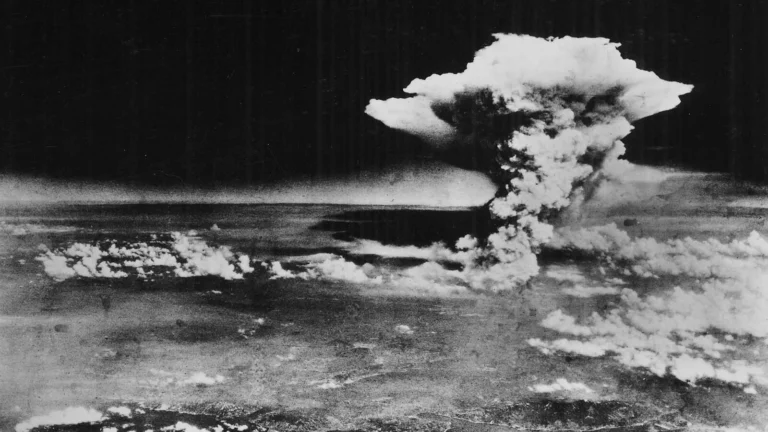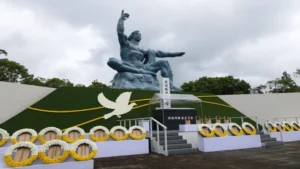Powerful Lessons from the 80th Nagasaki Atomic Bombing Anniversary

Nagasaki atomic bombing anniversary memorial ceremony in Peace Park 9/8//2025 Photo: perplexity
August 9, 2025 Hour: 11:19 am
Nagasaki commemorates the 80th atomic bombing anniversary with calls for peace, nuclear disarmament, and global unity to prevent future nuclear war.
Related: Hiroshima Memorial Set for Record Attendance in 2025
Nagasaki Atomic Bombing Anniversary: Reflecting on 80 Years of Nuclear Devastation
The Nagasaki atomic bombing anniversary on August 9, 2025, solemnly marks 80 years since the atomic bomb devastated the Japanese city—a catastrophic event that killed approximately 74,000 people. This historic commemoration at Nagasaki’s Peace Park, near the bombing hypocenter, gathered representatives from over 100 countries, setting a record for international participation in such a memorial.

Nagasaki Atomic Bombing Anniversary: Calls for Global Peace and Nuclear Disarmament
The commemoration was led by Nagasaki’s mayor, Shiro Suzuki, himself a descendant of survivors, who issued a fervent plea to the international community. Suzuki emphasized the urgent need to learn from past horrors to ensure Nagasaki remains the last city to suffer nuclear devastation. He warned that the world is currently “trapped in a vicious cycle of confrontation and division,” facing a crisis that could threaten humanity’s very survival through an increased risk of nuclear war.
Central to the event were testimonies from the hibakusha—survivors of the atomic attacks on Hiroshima and Nagasaki—who provided firsthand accounts of the suffering caused by the bomb. Among them, 93-year-old Hiroshi Nishioka, who was only three kilometers from the blast’s epicenter, described the lingering “invisible terror” long after the war ended. He stressed the imperative that atomic bombs must never be used again, warning that such use would mean “the end of the world.”
A poignant symbol of remembrance and hope was the ringing, for the first time in eight decades, of the restored bell of the Cathedral of the Immaculate Conception, echoing the call for peace.
Japan, the sole nation to have endured nuclear attacks, reaffirmed its commitment to the three non-nuclear principles—not to produce, possess, or introduce nuclear weapons—and positioned itself as a leader in the worldwide effort toward a nuclear-free future.
The Nagasaki ceremony, together with parallel activities in Hiroshima, underscored a pressing global call for nuclear peace and international mobilization to eliminate the threat posed by atomic weapons to humanity.
External links:
- United Nations Office for Disarmament Affairs (UNODA)
- International Campaign to Abolish Nuclear Weapons (ICAN)
- Nagasaki Peace Park Official Site
Geopolitical Context: The Continuing Threat of Nuclear War
The Nagasaki atomic bombing anniversary takes place amid an increasingly tense international landscape where the threat of nuclear conflict resurges. Heightened geopolitical confrontations and renewed arms races accentuate the risks that Mayor Suzuki warned of—leading experts and diplomats to stress the imperative for renewed commitment to nuclear disarmament treaties and peaceful conflict resolution.
Japan’s steadfast adherence to non-nuclear principles provides moral leadership in global forums, advocating for multilateral agreements aimed at eliminating nuclear arsenals and fostering diplomatic solutions to conflicts. The impact of past atomic bombings drives a unique awareness and urgency in Japan, shaping its diplomacy and peace activism.
This event serves as both a memorial to past horrors and a clarion call for the international community to commit seriously to preventing nuclear war, protecting human rights, and securing a peaceful future for all.
External links:
- Treaty on the Non-Proliferation of Nuclear Weapons (NPT) – IAEA
- Nuclear Threat Initiative (NTI)
- UN Office for Disarmament Affairs – Peace and Security
Nagasaki Atomic Bombing Anniversary: The Role of Youth and Education in Promoting Nuclear Peace
A crucial aspect of the Nagasaki atomic bombing anniversary commemoration is the emphasis on educating younger generations about the catastrophic consequences of nuclear warfare. The event highlighted the essential role that youth play in carrying forward the message of peace and nuclear disarmament. Educational programs, survivor testimonies, and cultural activities were designed to engage students and young activists from across the globe, fostering a deeper understanding of history, human suffering, and the urgent need for global cooperation.
Local and international educational initiatives have increasingly incorporated visits to Nagasaki’s Peace Park, survivor stories, and interactive workshops to build empathy and awareness among youth. The goal is to empower them as advocates for a world free of nuclear weapons and conflict. The mayor of Nagasaki, Shiro Suzuki, underscored that “nuclear peace is not just a legacy of the past—we must make it a living reality for future generations.”
This intergenerational approach aims to ensure that the horrors witnessed by the hibakusha will not be forgotten and that the growing global challenges related to nuclear proliferation and militarization are met with informed, passionate activism. The continued engagement of youth not only honors the memory of victims but also embodies hope for a safer and more peaceful future.
Author: JMVR
Source: Televisión de Nagasaki

